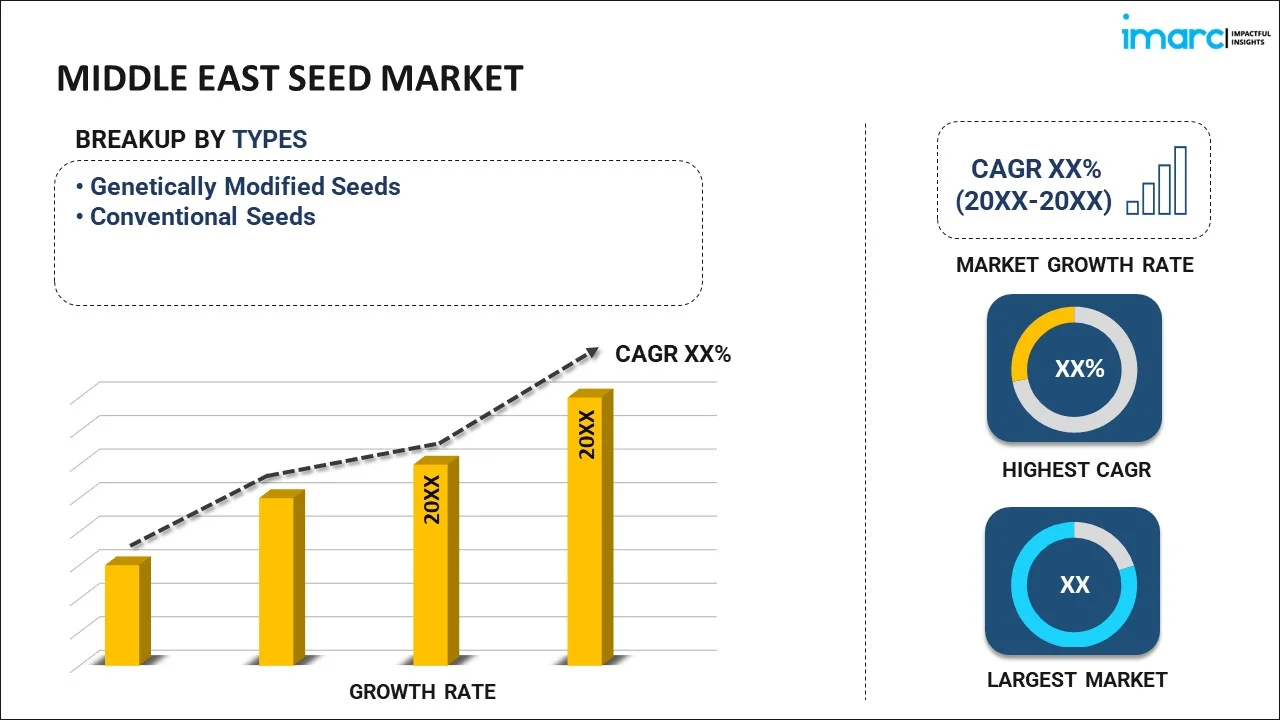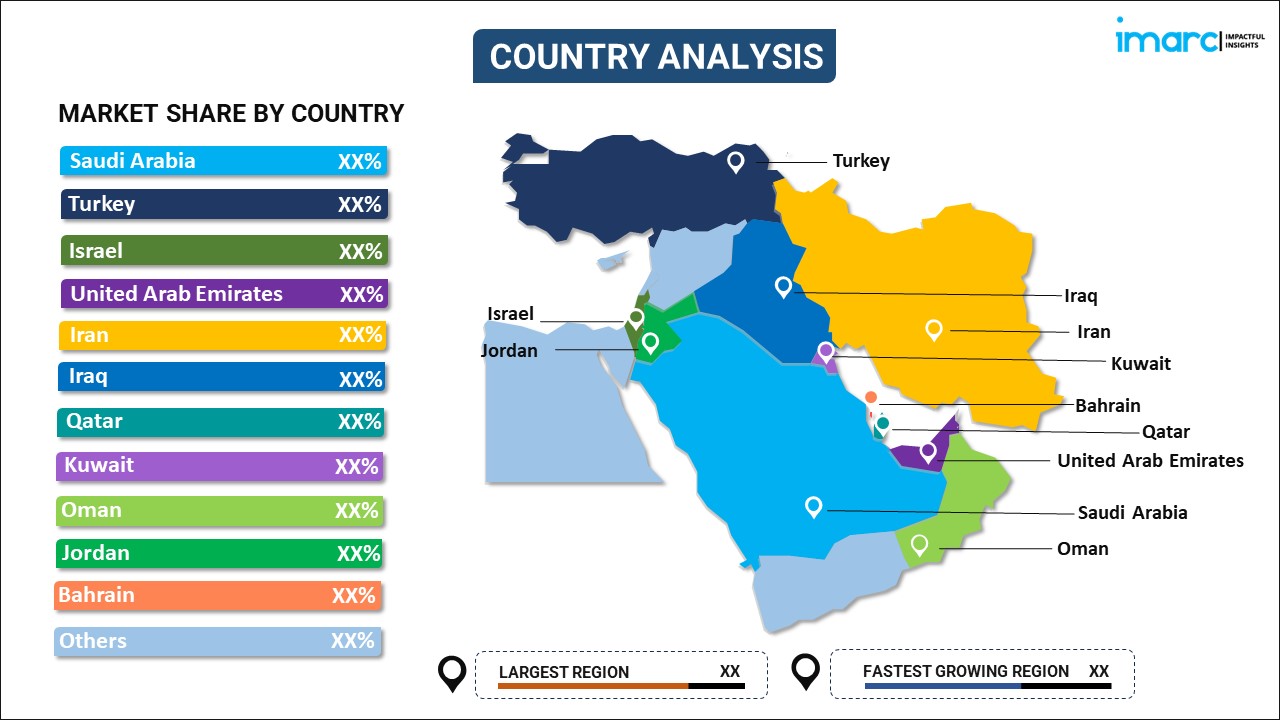
Middle East Seed Market Report by Type (Genetically Modified Seeds, Conventional Seeds), Seed Type (Oilseeds, Cereals and Grains, Fruits and Vegetables, Burpee and Park, and Others), Traits (Herbicide-Tolerant (HT), Insecticide-Resistant (IR), and Others), Availability (Commercial Seeds, Saved Seeds), Seed Treatment (Treated, Untreated), and Country 2026-2034
Market Overview:
Middle East seed market size reached USD 1,243.9 Million in 2025. Looking forward, IMARC Group expects the market to reach USD 2,390.3 Million by 2034, exhibiting a growth rate (CAGR) of 7.53% during 2026-2034. The increasing advances in biotechnology, genomics, and breeding techniques, which play a crucial role in the development of genetically modified (GM) seeds and improved crop varieties, are driving the market.
|
Report Attribute
|
Key Statistics
|
|---|---|
|
Base Year
|
2025
|
|
Forecast Years
|
2026-2034
|
|
Historical Years
|
2020-2025
|
|
Market Size in 2025
|
USD 1,243.9 Million |
|
Market Forecast in 2034
|
USD 2,390.3 Million |
| Market Growth Rate 2026-2034 | 7.53% |
Access the full market insights report Request Sample
A seed is a mature ovule containing the embryonic plant, stored food reserves, and a protective seed coat. It is a crucial reproductive structure in the life cycle of plants, facilitating the dispersal and germination of new individuals. Seeds arise from the fertilization of a plant's ovule by pollen, initiating the development of an embryo within the seed. This embryo has the potential to grow into a mature plant under suitable conditions. The stored nutrients within the seed provide sustenance for the developing embryo during germination, a process where the seed absorbs water and begins to sprout. Seeds exhibit remarkable diversity, reflecting the adaptability of plants to various environments. They serve as a means for plants to colonize new areas, ensuring their survival and contributing to the rich biodiversity of the planet. Additionally, seeds are essential for human sustenance, serving as a primary source of food and raw materials for numerous industries.
Middle East Seed Market Trends:
The seed market in the Middle East is influenced by a myriad of factors, with advancements in agricultural technology playing a pivotal role. Technological innovations, such as precision farming and genetic engineering, have significantly enhanced seed quality and crop yields. Consequently, these developments have fostered a growing demand for GM seeds that exhibit traits such as resistance to pests, diseases, and adverse climatic conditions. Furthermore, the increasing regional population and changing dietary preferences have intensified the need for higher agricultural productivity, propelling the seed market forward. Moreover, the rising awareness about sustainable farming practices has driven the adoption of hybrid and organic seeds. Farmers are increasingly recognizing the long-term benefits of using seeds that promote ecological balance and reduce the reliance on chemical inputs. In addition to this, government initiatives aimed at promoting sustainable agriculture and ensuring food security have provided a substantial impetus to the seed market. Additionally, climate change concerns, which have prompted a shift towards resilient seed varieties capable of withstanding extreme weather events, are expected to drive the seed market in the Middle East during the forecast period.
Middle East Seed Market Segmentation:
IMARC Group provides an analysis of the key trends in each segment of the market, along with forecasts at the regional and country levels for 2026-2034. Our report has categorized the market based on type, seed type, traits, availability, and seed treatment.
Type Insights:

To get detailed segment analysis of this market Request Sample
- Genetically Modified Seeds
- Conventional Seeds
The report has provided a detailed breakup and analysis of the market based on the type. This includes genetically modified seeds and conventional seeds.
Seed Type Insights:
- Oilseeds
- Soybean
- Sunflower
- Cotton
- Canola/Rapeseed
- Cereals and Grains
- Corn
- Wheat
- Rice
- Sorghum
- Fruits and Vegetables
- Tomatoes
- Lemons
- Brassica
- Pepper
- Lettuce
- Onion
- Carrot
- Burpee and Park
- Others
A detailed breakup and analysis of the market based on the seed type have also been provided in the report. This includes oilseeds (soybean, sunflower, cotton, and canola/rapeseed), cereals and grains (corn, wheat, rice, and sorghum), fruits and vegetables (tomatoes, lemons, brassica, pepper, lettuce, onion, and carrot), burpee and park, and others.
Traits Insights:
- Herbicide-Tolerant (HT)
- Insecticide-Resistant (IR)
- Others
The report has provided a detailed breakup and analysis of the market based on the traits. This includes herbicide-tolerant (HT), insecticide-resistant (IR), and others.
Availability Insights:
- Commercial Seeds
- Saved Seeds
A detailed breakup and analysis of the market based on the availability have also been provided in the report. This includes commercial seeds and saved seeds.
Seed Treatment Insights:
- Treated
- Untreated
The report has provided a detailed breakup and analysis of the market based on the seed treatment. This includes treated and untreated.
Country Insights:

To get detailed regional analysis of this market Request Sample
- Saudi Arabia
- Turkey
- Israel
- United Arab Emirates
- Iran
- Iraq
- Qatar
- Kuwait
- Oman
- Jordan
- Bahrain
- Others
The report has also provided a comprehensive analysis of all the major regional markets, which include Saudi Arabia, Turkey, Israel, United Arab Emirates, Iran, Iraq, Qatar, Kuwait, Oman, Jordan, Bahrain, and Others.
Competitive Landscape:
The market research report has also provided a comprehensive analysis of the competitive landscape in the market. Competitive analysis such as market structure, key player positioning, top winning strategies, competitive dashboard, and company evaluation quadrant has been covered in the report. Also, detailed profiles of all major companies have been provided.
Middle East Seed Market Report Coverage:
| Report Features | Details |
|---|---|
| Base Year of the Analysis | 2025 |
| Historical Period | 2020-2025 |
| Forecast Period | 2026-2034 |
| Units | Million USD |
| Scope of the Report | Exploration of Historical Trends and Market Outlook, Industry Catalysts and Challenges, Segment-Wise Historical and Future Market Assessment:
|
| Types Covered | Genetically Modified Seeds, Conventional Seeds |
| Seed Types Covered |
|
| Traits Covered | Herbicide-Tolerant (HT), Insecticide-Resistant (IR), Others |
| Availabilities Covered | Commercial Seeds, Saved Seeds |
| Seed Treatments Covered | Treated, Untreated |
| Countries Covered | Saudi Arabia, Turkey, Israel, United Arab Emirates, Iran, Iraq, Qatar, Kuwait, Oman, Jordan, Bahrain, Others |
| Customization Scope | 10% Free Customization |
| Post-Sale Analyst Support | 10-12 Weeks |
| Delivery Format | PDF and Excel through Email (We can also provide the editable version of the report in PPT/Word format on special request) |
Key Questions Answered in This Report:
- How has the Middle East seed market performed so far and how will it perform in the coming years?
- What is the breakup of the Middle East seed market on the basis of type?
- What is the breakup of the Middle East seed market on the basis of seed type?
- What is the breakup of the Middle East seed market on the basis of traits?
- What is the breakup of the Middle East seed market on the basis of availability?
- What is the breakup of the Middle East seed market on the basis of seed treatment?
- What are the various stages in the value chain of the Middle East seed market?
- What are the key driving factors and challenges in the Middle East seed?
- What is the structure of the Middle East seed market and who are the key players?
- What is the degree of competition in the Middle East seed market?
Key Benefits for Stakeholders:
- IMARC’s industry report offers a comprehensive quantitative analysis of various market segments, historical and current market trends, market forecasts, and dynamics of the Middle East seed market from 2020-2034.
- The research report provides the latest information on the market drivers, challenges, and opportunities in the Middle East seed market.
- Porter's five forces analysis assist stakeholders in assessing the impact of new entrants, competitive rivalry, supplier power, buyer power, and the threat of substitution. It helps stakeholders to analyze the level of competition within the Middle East seed industry and its attractiveness.
- A competitive landscape allows stakeholders to understand their competitive environment and provides an insight into the current positions of key players in the market.
Need more help?
- Speak to our experienced analysts for insights on the current market scenarios.
- Include additional segments and countries to customize the report as per your requirement.
- Gain an unparalleled competitive advantage in your domain by understanding how to utilize the report and positively impacting your operations and revenue.
- For further assistance, please connect with our analysts.
 Request Customization
Request Customization
 Speak to an Analyst
Speak to an Analyst
 Request Brochure
Request Brochure
 Inquire Before Buying
Inquire Before Buying




.webp)




.webp)












